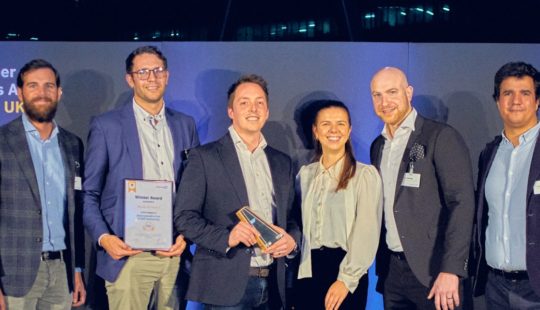Using insights from our latest webinar ‘How UK Government Transformation Can Fuel a Brilliant Civil Service’, Leila Romane, Head of Public Sector at SAP UK & Ireland, explores how SAP-powered digital transformation in the public sector will transform lives.
Although transforming public sector services holds huge benefits for government and citizens alike, first you must get there. And as if digital transformation itself isn’t a big enough challenge, the disruption of Brexit and COVID-19 have further increased the challenge on the social and economic planning around digital transformation.
It’s well recognised that doing nothing is the passive road to long term failure. But moving a government department to an outcome-based focus around citizen experience, data centricity and workforce wellbeing requires new types and levels of engagement from civil servants, staff, IT vendors, ecosystem partners and of course citizens using new services.
Old-fashioned outdated systems are only part of the problem as they don’t drive change or enable government departments to be agile or strategic – particularly when it comes to strategic workforce planning, learning and skills development, employee and citizen experience management or business planning.
The answer is more than just a robust single IT operating platform.
At SAP, we think software vendors and delivery partners alike should be stepping up to help – properly help – to facilitate an effective change model for the public sector, rather than just selling and implementing a technology model. We recognise that transformations are more than just a change in technology; they have the potential to rewrite the genetics of a department.
The whole SAP business is committed to making a meaningful and lasting difference in the public sector. We understand there is a different approach required and are equipped with our ‘start anywhere, go everywhere’ approach, to demonstrate our dedication to the public sector.
So, we’ve put ourselves in our customers shoes. We’ve mapped out the traditional obstacles to effective transformation, listened to their drivers for change and acknowledged the public sector idiosyncrasies to design a model specific to the public sector
One of the key lessons that Jenny Churchard, Cloud Lead at Government Shared Services, shared from her experience with GSS transformations was how they should ‘adopt not adapt’. When moving to the cloud, government departments want something they can take out the box and use, rather than coding a convoluted system that will be outdated before it’s even implemented.
That’s why the SAP framework enables organisations to use a model company method to protect business as usual, address areas where they have the most pressing need and ensure the mental wellbeing of staff throughout the process and beyond.
Very few public sector departments have the same starting point when it comes to digital transformation projects. Historically that’s been a problem because software vendors have been pushing solutions that force organisations to start and finish at specific points with little consideration for their own specific context.
Deborah Gregg, Public Sector Consultant at Deloitte, highlighted ‘not boiling the ocean’ as key to long term success for shared service transformations. At SAP, we whole–heartedly agree. We think organisations should be able to start anywhere and go everywhere at their own pace. That’s why SAP takes a modular approach that lets organisations rapidly deploy different modules of functionality at different times and according to their own timeframes and unique requirements. This not only reduces risk but also increases confidence of success for government departments. Such a modular approach allows for different pain points to be targeted in advance of a wider transformation, enhancing user experience more rapidly.
Historically, transformations were viewed simply as changes in technology and so users were often left floundering with new systems that hindered their day-to–day, rather than enhance.
This is not the case with SAP. Employee experience is a critical consideration throughout digital transformations in the public sector. We want to fulfil the government shared services’ vision, positioned by Andy Helliwell, Executive Director, Government Shared Services, of “a future where public servants’ ability to support government priorities and deliver services to them is enhanced by the shared services provided to them.”
Neil Stoker, Head of HR Systems & Pension Solutions, Group Human Resources, Department for Transport, acknowledged that staff approval and satisfaction with the usability of SAP systems was a significant factor as to their continued relationship with SAP. He referenced the example that ‘floor walkers’ were sent away after less than two days during the most recent stage of the Department for Transport’s digital transformation journey, as the user interface was so easily navigated. This not only highlighted that SAP technology is user-friendly, but just how pivotal user experience is to the civil service.
However, the elephant in the room is of course the current COVID-19 pandemic. Enacting a transformation journey in the current climate is surely an insurmountable feat?
Deborah Gregg suggested otherwise. She commented that as the longevity of virtual working looks more and more likely, government shared services are increasingly looking at workforce management, digital enablement and agility in processes. Therefore, the public sector’s attention continues to look to a digital network that can support such a fluid environment.
SAP can easily target these focus areas, and as demonstrated we have the passion, understanding, flexibility and – let’s not forget – the technology to power digital transformations that will fuel a brilliant civil service.
Ultimately, one of the reasons many people spend their careers in the public sector is often through a sense of wanting to give back and gain greater fulfilment from work. SAP is entirely committed to supporting the ethics and experiences of those who deliver our public services, and would take pride in doing so.
As you can see, SAP is keen to actively listen to UK government organisations about how we can help improve people’s lives, responding by tailoring our approach accordingly. Another thing we’ve learnt from our public sector customers and partners is that they want is to hear from companies who have already been down the digital transformation path and we can make that happen.
If you would like to learn more about how SAP is working with the public sector, you can view the previous webinar and sign up to Episode 2: How UK Government Transformation Can Fuel a Brilliant Civil Service here.
By Leila Romane, Head of Public Sector at SAP UK & Ireland.



